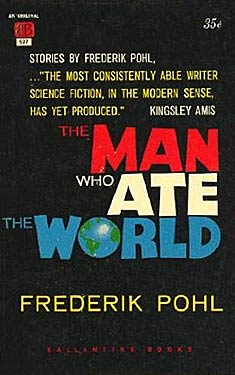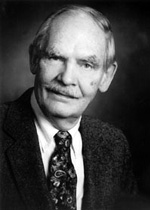GMRC Review: The Man Who Ate the World by Frederik Pohl
 Long time WWEnd member and Uber User, Emil Jung, is an obsessive SF/F reader and as such he’s become a huge supporter of WWEnd. (We often refer to him as our "South African Bureau.") Besides hanging out here, Emil writes poetry on his blog emiljung.posterous.com. This is the third of Emil’s GMRC reviews to feature in our blog.
Long time WWEnd member and Uber User, Emil Jung, is an obsessive SF/F reader and as such he’s become a huge supporter of WWEnd. (We often refer to him as our "South African Bureau.") Besides hanging out here, Emil writes poetry on his blog emiljung.posterous.com. This is the third of Emil’s GMRC reviews to feature in our blog.
 Although Frederik Pohl‘s work began in the Campbellian era, he has always helped to determine the future of the genre through measured work as an editor, anthologist and writer. He began his career as a magazine editor in 1940 and wrote extensively with Jack Williamson and C. M. Kornbluth.
Although Frederik Pohl‘s work began in the Campbellian era, he has always helped to determine the future of the genre through measured work as an editor, anthologist and writer. He began his career as a magazine editor in 1940 and wrote extensively with Jack Williamson and C. M. Kornbluth.
With Kornbluth he produced the classic The Space Merchants (1953), which describes a future world dominated by advertising, a theme preceded here by a few years in the stories "The Wizards and the Waging" and "The Waging of the Peace", taking a "slickly ironic" look (to quote John Clute from The Encyclopedia of Science Fiction) at how humans react to everyday commercial products pushed into their faces. It’s incredibly fun to read about how the National Electro-Mech fortified factory inundates a small town Buick salesman with new Buicks and how the very same salesman ends up as a recruit in attacking and stopping the production of these cars. These final two stories, arguably the best in the collection, are slightly anti-capitalist satire. Nothing strange here, considering Pohl’s short foray in the Young Communist League during the late 1930s. Shortly hereafter – as a side note – he enlisted in the army, and, in weird twist of fate, served with Jack Williamson as a weather observer.
The title story "The Man Who Ate the World" is the weakest in the collection and is the only one I remember reading as a youngster. It’s a tragic story about this child growing up and trained to consume and consume, without his parents nurturing him. This important part of early childhood development is left to robots. Eventually, as an adult, he continues to consume and build robots to produce robots that destroy robots, ever repeating the cycle of consumption, ultimately threatening the existing world order. A psychologist comes to the rescue, reuniting the adult child with his teddy. Yeh, yeh, a cop-out and archaic Freudian psychology, but I did say this is the weakest story in the collection. It does not detract from Pohl’s more than subtle jab at American consumerism, that expectation for people to consume, buy, and destroy in order to repeat the cycle. Despite my gripe about the teddy, the story is still fun… and its insinuation certainly still rings true for modern day consumerism.
"The Snowmen" is my personal favorite, at 8 pages the shortest in the collection, and most bizarre, even cadaverous, hinting at a certain Roald Dahl chromaticity. Pohl skillfully unfolds the whole allegory in which in courting couple invites an alien visitor into the woman’s home. Her reputation, it seems, is well-known throughout the existing universe. While she entertains the alien, the man plunders and loots the alien craft, with a wonderfully macabre twist at the end.
 "The Day the Icicle Works Closed" is about economic manipulation and collapse. A distant planet is cut off from trade and most people resort to renting their bodies to tourists while their minds perform hard labor elsewhere, usually inside gigantic machines, underground, in mines. The scientific mechanism on just how this happen is not explained, but that isn’t the point, is it? Pohl sets up a society that is forced to survive through disagreeable means because of economic disparity. So we see some ex-factory workers attempting to kidnap the mayor’s sons for ransom instead of whoring out their bodies to reckless and inconsiderate tourists. Ever considered your own behavior when driving a rental?
"The Day the Icicle Works Closed" is about economic manipulation and collapse. A distant planet is cut off from trade and most people resort to renting their bodies to tourists while their minds perform hard labor elsewhere, usually inside gigantic machines, underground, in mines. The scientific mechanism on just how this happen is not explained, but that isn’t the point, is it? Pohl sets up a society that is forced to survive through disagreeable means because of economic disparity. So we see some ex-factory workers attempting to kidnap the mayor’s sons for ransom instead of whoring out their bodies to reckless and inconsiderate tourists. Ever considered your own behavior when driving a rental?
In Pohl’s novels Jem: The Making of a Utopia (1979) and Man Plus (1976) we meet characters who adapt to their strange environments by losing, or changing their humanity. Although "The Seven Deadly Virtues" do not address the exact same issues we do recognize similar themes. The story is set on Venus and I can’t imagine a harsher environment to live in. It’s an interesting society featuring a conditioning response to killing – you simply cannot do it. That aside, once you have acclimatised fully to conditions on Venus, there is no leaving. And once society has shunned you, you become a non-person. This happens to a relative new arrival to Venus, who steals the wife of a very powerful man, resulting in his ostracization. Someone else, also shunned, is included in the plot to topple the powerful man. The solution is masterfully done and very plausible.
All in all, this is a stunning collection of six short stories by a master storyteller, and despite them being dated by 50+ years, still quite unique and remarkably prescient, generally poking fun at mass production, consumerism and industrialization. These stories of social criticism were a blast and expose Frederik Pohl as the hidden hero of SF. Think of him in terms of the Golden Age. He knew them all – who else is still alive?



















 Full Details
Full Details


5 Comments
Oh I always enjoy a good poke at consumerism. Reverend Billy anyone? Nice review – if there is an element of SF that I haven’t explored enough (there are many, actually) it is short stories. I want to check these out now.
Great review! I wonder if Pohl was the first to use some of these now-familiar elements. For instance, I’ve seen a lot of stories that in some way include the renting of bodies or toiling of minds in machines like you described in "The Day the Icicle Works Closed".
@Jeremy my love for SF started with short stories! Sadly, I’ve come to neglect them, but when Dave mentioned that he loves to read short stories, often as intermission from a novel, or just as a quick read before going to bed, I tried them out again. I’ve since given anthologies, or short story collections better attention. It is a good way by which one becomes familiar with a chosen author’s universe. Pohl’s earlier stories frequently satirize and attack American consumer culture. @Allie, interesting question, and observation! It’s debatable whether or not we can include John Carter as an example of this, or Lovecraft’s "The Thing on the Doorstep", all predating Pohl’s story. I guess these are more examples of body swapping than mind-uploading and the likes. Even if Pohl’s elements were not the first in the tradition, he was nonetheless very inventive and playful with sociological SF, exaggerating and satirizing real-life social forces and trends. It is for this I revere him as an author, and Grand Master.
With few exceptions, at least for writers active in the ’40s and ’50s, short stories are essential. Many did their best work at short length, and you can get a better idea of the breadth and variety of a particular writer’s work much more quickly by reading their shorter work… Almost no SF novels were published (though some were serialized in magazines) prior to the ’50s, so writers like Pohl (and many of the other grand masters) wrote with the magazine market in mind. Nowadays, I also read a few stories in between novels. Usually, I’ve in the middle of a couple of story collections or anthologies all the time…I was planning on rereading The Space Merchants soon. This collection sounds like a nice complement to it.
Now I feel like I’ve really been missing out mainly sticking to novels. Gonna have to reverse that trend
Sorry, the comment form is closed at this time.